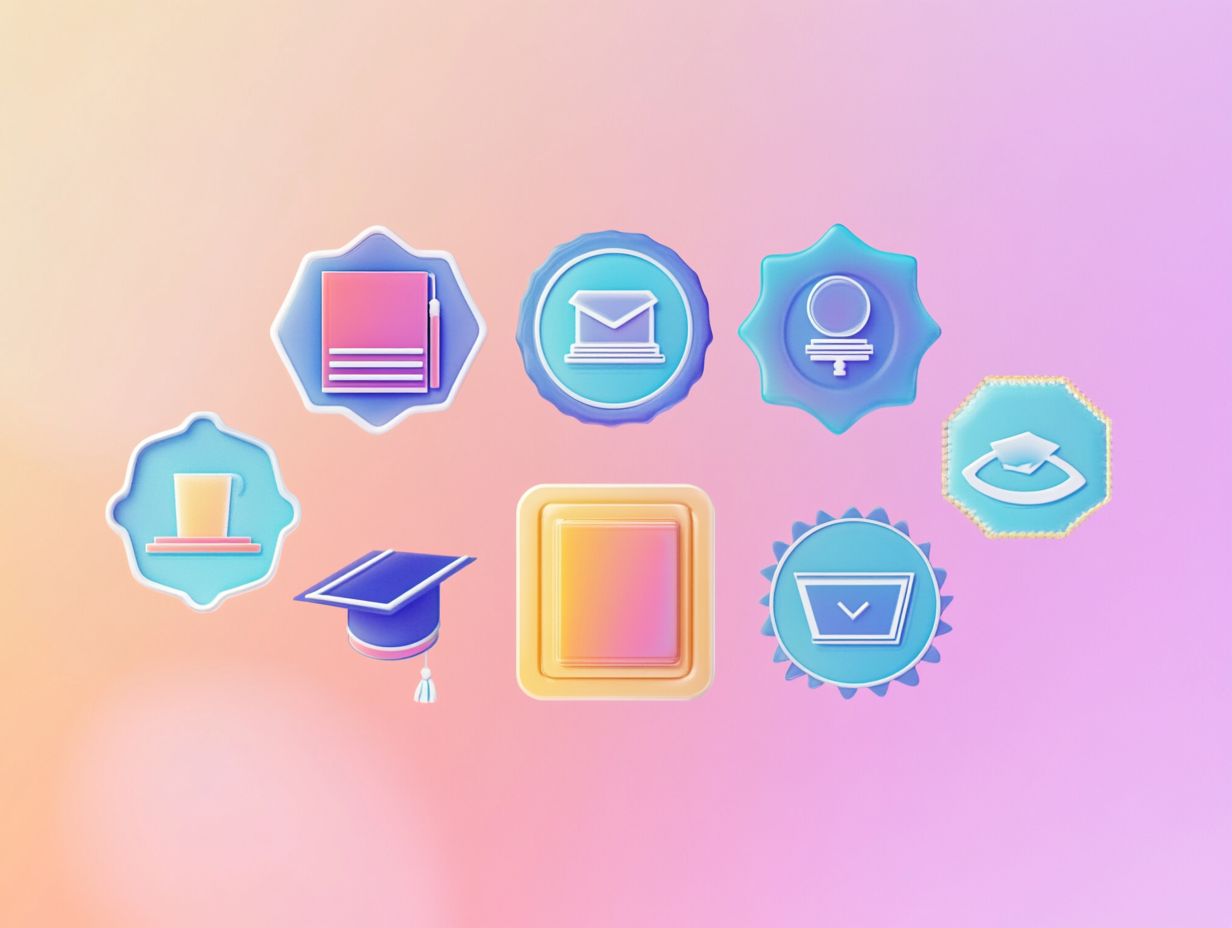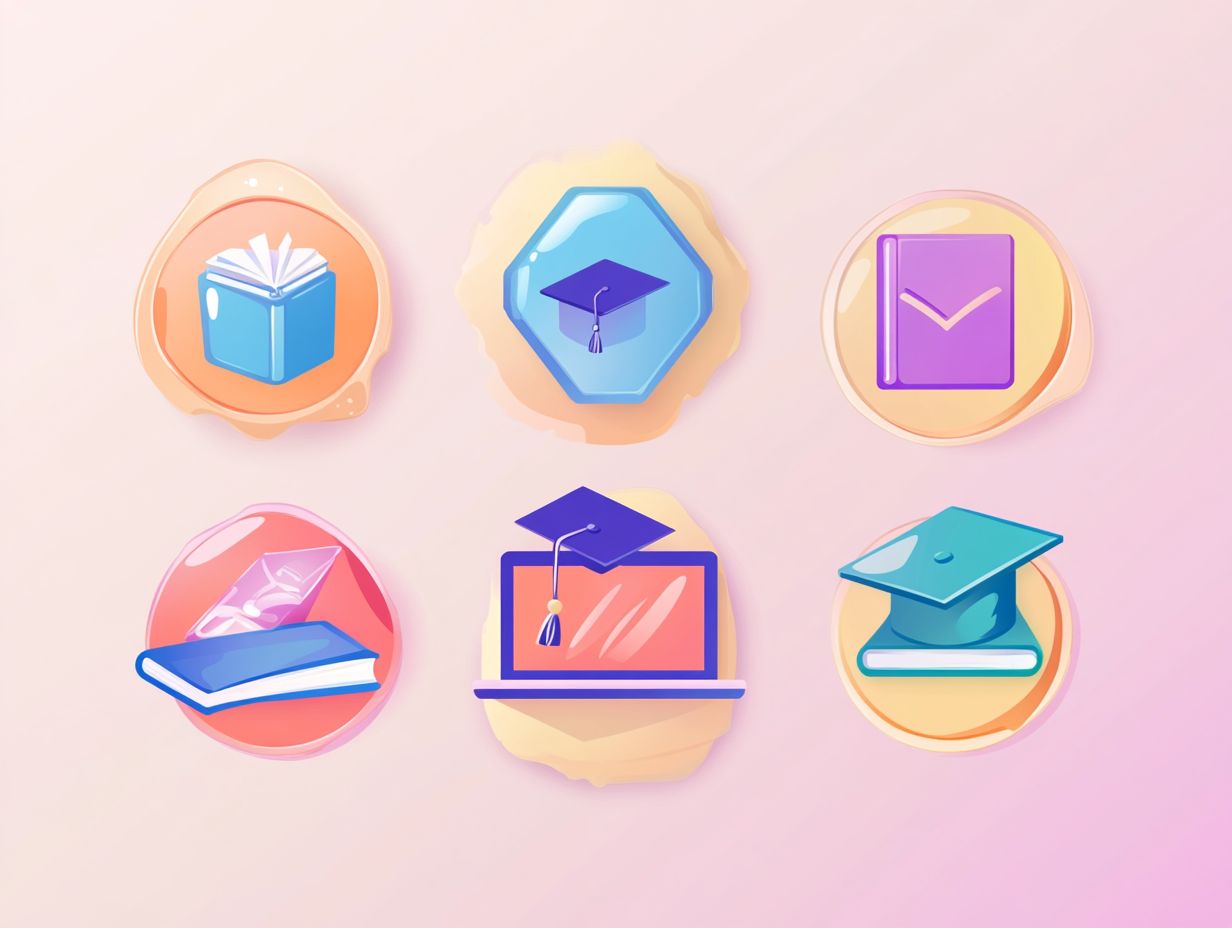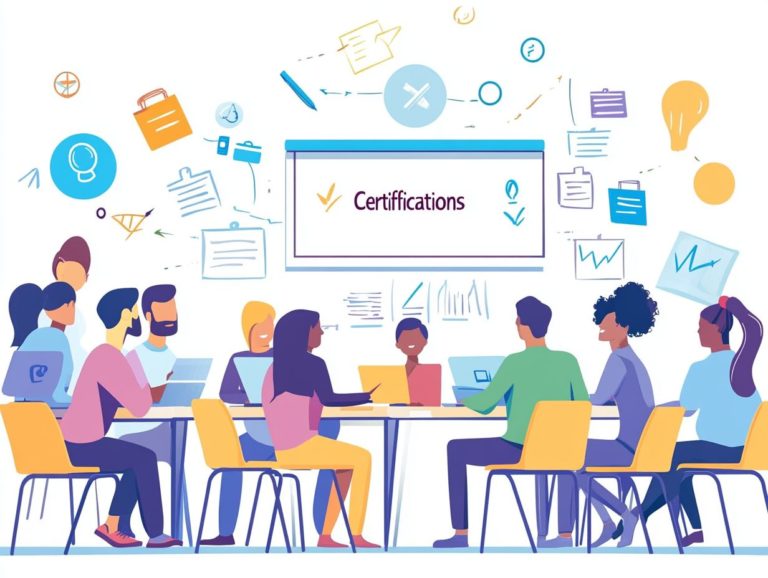5 Top Educational Certifications for Online Instructors
In today s digital age, online education has revolutionized the teaching landscape, offering unprecedented accessibility and diversity.
As an aspiring online instructor, acquiring the right certifications can distinguish you from the crowd and significantly enhance your career prospects.
This article delves into five premier educational certifications spanning from TESOL to specialized online teaching credentials.
You ll discover the benefits of each certification, the skills you’ll need, the steps to obtain them, and their associated costs, equipping you to navigate your journey in the virtual classroom with confidence and clarity.
Contents
- Key Takeaways:
- 1. Teaching English as a Second Language (TESOL) Certification
- 2. Certified Online Instructor (COI) Certification
- 3. Certified Distance Learning (CDL) Certification
- 4. Certified Online Learning Facilitator (COLF) Certification
- 5. Certified Online Learning Administrator (COLA) Certification
- What Are the Benefits of Obtaining These Certifications?
- How Do These Certifications Help in Career Advancement?
- What Skills and Knowledge Are Required for These Certifications?
- How Can One Obtain These Certifications?
- What Are the Costs Involved in Obtaining These Certifications?
- What Are the Different Levels of These Certifications?
- Frequently Asked Questions
- 1. What are the top 5 educational certifications for online instructors?
- 2. Why is it important for online instructors to have these certifications?
- 3. How can I obtain these certifications?
- 4. Are these certifications recognized internationally?
- 5. Do these certifications expire?
- 6. Are there any other certifications that can benefit online instructors?
Key Takeaways:

- TESOL Certification equips online instructors with the skills and knowledge needed to effectively teach English to non-native speakers.
- COI Certification demonstrates a mastery of online teaching methods and technologies, making instructors more competitive in the job market.
- CDL Certification prepares instructors to design and deliver engaging distance learning courses, expanding their teaching opportunities.
1. Teaching English as a Second Language (TESOL) Certification
The TESOL (Teaching English as a Second Language) Certification stands as a crucial credential for you as an educator aspiring to teach English to non-native speakers. This certification gives you essential teaching skills. It is tailored for diverse classrooms and different learning environments.
It enhances your professional development. You ll gain tools to foster student engagement and effective learning strategies, especially online.
This leads to successful course completion and bolsters your credentials.
By integrating various course materials like lesson plans and classroom management strategies this certification empowers you to tailor content specifically for each student’s needs!
Platforms like Coursera and the TESOL International Association offer convenient pathways to obtain this certification, making it easier for you to weave specialized training into your busy schedule.
Acquiring TESOL certification not only elevates your qualifications in early childhood education but also opens doors to global teaching opportunities, giving you the power to make a meaningful impact on young minds across different cultures.
2. Certified Online Instructor (COI) Certification
The Certified Online Instructor (COI) Certification is tailored for you, as an educator, who aspires to elevate your online teaching prowess. It focuses on effective instructional methodologies and teaching practices that truly engage students and promote active learning.
This certification highlights the significance of course feedback, giving you the power to take the lead in online learning platforms and stay at the latest trends in teaching.
The curriculum dives into essential components, introducing you to diverse teaching strategies specifically designed for virtual classrooms that encourage collaboration and participation.
You ll master the art of designing assessments methods used to evaluate student understanding and progress that align seamlessly with learning objectives while fostering authentic learning experiences.
By equipping yourself with these vital skills, the COI certification supports your journey as an educator leader, helping you adapt to the ever-evolving landscape of online instruction and refine your teaching practices.
This program not only boosts your personal teaching effectiveness but also enriches the interactive learning environment for your students.
3. Certified Distance Learning (CDL) Certification
Certified Distance Learning (CDL) Certification is essential for you as an educator aiming to thrive in the distance learning arena. It equips you with the skills necessary to craft effective online courses that meet prerequisites and adhere to educational standards.
This certification highlights the significance of social-emotional learning and effective student assessment techniques. Ultimately, it enriches the learning experience.
In our increasingly digital world, it’s vital for you to grasp technological tools while also understanding the nuances of virtual engagement. CDL certification offers valuable insights into designing interactive curricula that actively engage students.
By fostering a sense of community in remote environments, it guides you in implementing diverse assessment methods. These methods accurately gauge student progress and competencies, ensuring you can provide personalized feedback and tailored instruction.
The training also emphasizes building relationships and trust in a virtual setting, crucial for motivating learners. By obtaining this certification, you position yourself to navigate the complexities of online teaching methods more effectively, enriching the educational experience for everyone involved.
4. Certified Online Learning Facilitator (COLF) Certification

The Certified Online Learning Facilitator (COLF) Certification equips you to guide students effectively in online learning environments. It emphasizes interactive learning and innovative teaching strategies that significantly enhance engagement and retention.
By obtaining this certification, you elevate your credentials and acquire essential skills for comprehensive course evaluation and improvement.
This program inspires you to transform traditional teaching into vibrant, interactive experiences! You will explore a variety of interactive learning methods, such as collaborative projects, discussion forums, and multimedia resources.
These strategies strengthen connections between you and your learners while promoting active participation, a key factor in sustaining student interest.
Through hands-on experience and constructive peer feedback, you will discover the profound impact of your facilitative role in creating an engaging virtual classroom. This ultimately drives improved learning outcomes and satisfaction among your students.
5. Certified Online Learning Administrator (COLA) Certification
The Certified Online Learning Administrator (COLA) Certification is designed specifically for educators like you who aim to manage online learning programs. It seamlessly blends your knowledge of learning management systems with innovative educational practices, ensuring that you can deliver course materials effectively.
This certification is crucial for achieving accreditation for online programs and nurturing educational innovation within your institution.
By equipping you with essential skills in program management and oversight, this certification enhances your ability to supervise the development and implementation of engaging online curricula. You will learn to navigate the complexities of accreditation processes, focusing on continuous improvement and quality assurance in your educational offerings.
The COLA certification also encourages you to integrate the latest advancements in teaching methods and technology trends, giving you the power to create dynamic learning environments that cater to diverse student needs.
This prepares you to confidently lead your institution into the future of online education, ensuring that your programs meet rigorous academic standards while embracing innovative teaching methodologies.
What Are the Benefits of Obtaining These Certifications?
Obtaining certifications such as TESOL, COI, CDL, COLF, and COLA opens a world of opportunities for you as an educator. These credentials enhance your career prospects and refine your teaching methods, equipping you to navigate the ever-evolving landscape of online education.
Each certification stands as a testament to your commitment to lifelong learning and professional development. They earn you recognition across various online platforms for your enhanced skills and knowledge.
Mastering specialized knowledge through these certifications enriches your teaching practice, positioning you as a leader within your institution. This elevated professional stature can lead to exciting roles in curriculum development, educational leadership, or administrative positions, creating a pathway for a more impactful career.
As educational institutions prioritize innovative teaching strategies, you will be perfectly poised to lead change and inspire your colleagues through your expertise. This ultimately fosters a more fulfilling and progressive educational environment.
How Do These Certifications Help in Career Advancement?
These certifications significantly enhance your career prospects as an educator. They add weight to your credentials and demonstrate your dedication to professional development, especially when considering the top 10 online educational certification programs reviewed for online teaching.
By acquiring these certifications, you equip yourself with sought-after teaching skills that are highly valued in today’s digital learning environments. Such qualifications can transform your career, opening doors to leadership roles like instructional coordinators or department heads. For those in the nonprofit sector, exploring the top 7 educational certifications for nonprofits can further enhance your impact on curriculum development and teaching strategies.
As educational institutions emphasize remote instruction, the demand for educators with specialized training in teaching methods continues to rise, creating numerous job opportunities.
For example, a teacher who secures a certification in digital learning becomes a more competitive candidate for positions at forward-thinking schools that offer hybrid or fully online programs.
This trend illustrates how advanced credentials elevate your profile and align with the changing landscape of education, making you a valuable asset in any academic setting.
What Skills and Knowledge Are Required for These Certifications?

The skills and knowledge required for these certifications span a wide range of teaching methods, such as effective assessment design and interactive learning strategies. For educators looking to excel in online education, exploring unique educational certifications can be vital, as these methods involve engaging students actively in their learning process.
By understanding these methodologies, you can create dynamic learning environments where students feel genuinely invested in their education. For instance, effective assessment design does more than measure understanding; it inspires learners to engage deeply with the material.
Incorporating innovative teaching techniques, like collaborative projects or technology-enhanced lessons, cultivates a sense of community and encourages active participation among students. These skills are crucial, as they enhance knowledge retention and equip students with the tools they need for real-world applications, making the educational experience impactful and relevant.
How Can One Obtain These Certifications?
To obtain these certifications, you typically need to complete a series of courses tailored to meet specific prerequisites. This journey culminates in a certificate of completion, validating your skills and knowledge in the field.
Fortunately, many of these programs are offered through various online learning platforms, providing a flexible and accessible path.
Your first step is to research and select the right program that aligns with your career goals. Once you’ve made your choice, the enrollment process usually involves filling out an application and, in some cases, providing proof of prior qualifications.
The courses you encounter may span from a few weeks to several months, depending on the subject matter depth. Throughout this journey, you’ll engage in assessments such as quizzes, projects, and final exams to showcase your understanding.
Notable platforms like Coursera, edX, and Udacity stand out as popular choices for educators seeking accreditation. Don’t miss this chance to boost your career! Enroll in a program today!
What Are the Costs Involved in Obtaining These Certifications?
The costs of obtaining certifications vary significantly. They depend on the online provider, course complexity, and whether it’s self-paced or instructor-led.
Balance these costs with the value the certifications can add to your career. Many programs have tiered pricing, payment plans, and early enrollment discounts.
Explore financial aid options such as scholarships, grants, and employer-sponsored training. These can ease the financial burden and should be evaluated against the long-term benefits.
With improved skills and credentials, your career could take off, leading to higher salaries and numerous job opportunities. This initial investment can pay off over time.
What Are the Different Levels of These Certifications?
The certification levels cater to various stages of your teaching career. From foundational certifications for entry-level educators to advanced ones that enhance specialized skills, there s something for everyone.
At the entry level, you’ll learn essential tools and techniques for a solid teaching foundation. Intermediate certifications deepen your understanding of pedagogy and classroom management.
In advanced certifications, you focus on specialized areas like instructional technology and curriculum development. These help you expand your expertise and take on more significant roles.
Each level targets specific skills and aligns with your professional development goals, creating a clear pathway for growth.
Frequently Asked Questions

1. What are the top 5 educational certifications for online instructors?
The top 5 educational certifications for online instructors are:
- Online Teaching Certification
- Blended Learning Certification
- Instructional Design Certification
- E-Learning Certification
- Virtual Classroom Certification
2. Why is it important for online instructors to have these certifications?
These certifications provide the training and skills necessary for effective online teaching. Additionally, exploring the top 5 online platforms for business certifications can show your commitment to the profession, increasing job opportunities and earning potential.
3. How can I obtain these certifications?
Many organizations offer these certifications through online or in-person courses. For a comprehensive list, check out the top 5 online platforms for marketing certifications, which include examples like the Online Learning Consortium and the International Society for Technology in Education.
4. Are these certifications recognized internationally?
Most certifications are recognized internationally, as they follow standard industry practices. Research specific certifications for their recognition before enrolling.
5. Do these certifications expire?
Most educational certifications do not expire. However, staying updated through professional development is recommended to maintain relevant skills.
6. Are there any other certifications that can benefit online instructors?
Yes, other certifications can enhance your teaching skills. Examples include TESOL certification for teaching English as a second language and subject-specific certifications for areas like coding or graphic design.






